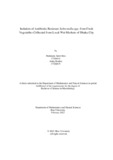| dc.contributor.advisor | Haque, Fahim Kabir Monjurul | |
| dc.contributor.author | Ritu, Mahmuda Akter | |
| dc.contributor.author | Bushra, Anika | |
| dc.date.accessioned | 2023-05-15T04:08:28Z | |
| dc.date.available | 2023-05-15T04:08:28Z | |
| dc.date.copyright | 2023 | |
| dc.date.issued | 2023-02 | |
| dc.identifier.other | ID 17326016 | |
| dc.identifier.other | ID 17326019 | |
| dc.identifier.uri | http://hdl.handle.net/10361/18283 | |
| dc.description | This thesis is submitted in partial fulfillment of the requirements for the degree of Bachelor of Science in Microbiology, 2023. | en_US |
| dc.description | Catalogued from PDF version of thesis. | |
| dc.description | Includes bibliographical references (pages 39-44). | |
| dc.description.abstract | In Bangladesh, eating raw vegetables that have undergone less processing is becoming very popular. Consuming fresh vegetables contaminated with significant gastrointestinal pathogenic bacteria like Salmonella increases the risk of food poisoning. The aim of the study was to ascertain the prevalence of Salmonella spp. in fresh vegetables from different areas of Dhaka city in different seasons. A total of 39 of the 100 raw vegetable samples were positive for Salmonella spp. However, the highest positive samples for Salmonella spp. were mint (80%) and Green chili (70%), and the total percentage of positive samples was higher in summer (56.4%) than in winter (43.6%). Antibiotic susceptibility test of these isolates was performed using 14 antibiotics belonging to eleven groups which revealed that all the isolates (100%) were resistant to Penicillin, Clindamycin, and Metronidazole. The study showed significant resistance of Salmonella spp. to third-generation antibiotics such as Amoxicillin, Ceftriaxone, and Levofloxacin which is a pure concern. However, commonly used antibiotics Gentamycin, Co–Trimoxazole, and Imipenem were reported to be very effective against Salmonella spp. with sensitivity rates of 99%, 94%, and 88% respectively. In addition, the antibiotic susceptibility pattern of the isolates revealed that all of the isolates were resistant to antibiotics of at least three different groups with Multiple Antibiotic Resistant index of 0.28 which denoted that the isolates were multi-drug resistant and there was a significant risk of cross-contamination and uncontrol use of antibiotics to the food products. | en_US |
| dc.description.statementofresponsibility | Mahmuda Akter Ritu | |
| dc.description.statementofresponsibility | Anika Bushra | |
| dc.format.extent | 44 pages | |
| dc.language.iso | en | en_US |
| dc.publisher | Brac University | en_US |
| dc.rights | Brac University theses are protected by copyright. They may be viewed from this source for any purpose, but reproduction or distribution in any format is prohibited without written permission. | |
| dc.subject | Salmonella spp. | en_US |
| dc.subject | Raw vegetables | en_US |
| dc.subject | Resistance | en_US |
| dc.subject | Sensitivity | en_US |
| dc.subject | MAR index | en_US |
| dc.subject.lcsh | Drug resistance in microorganisms | |
| dc.title | Isolation of antibiotic resistant salmonella spp. from fresh vegetables collected from local wet markets of Dhaka city | en_US |
| dc.type | Thesis | en_US |
| dc.contributor.department | Department of Mathematics and Natural Sciences, Brac University | |
| dc.description.degree | B. Microbiology | |

